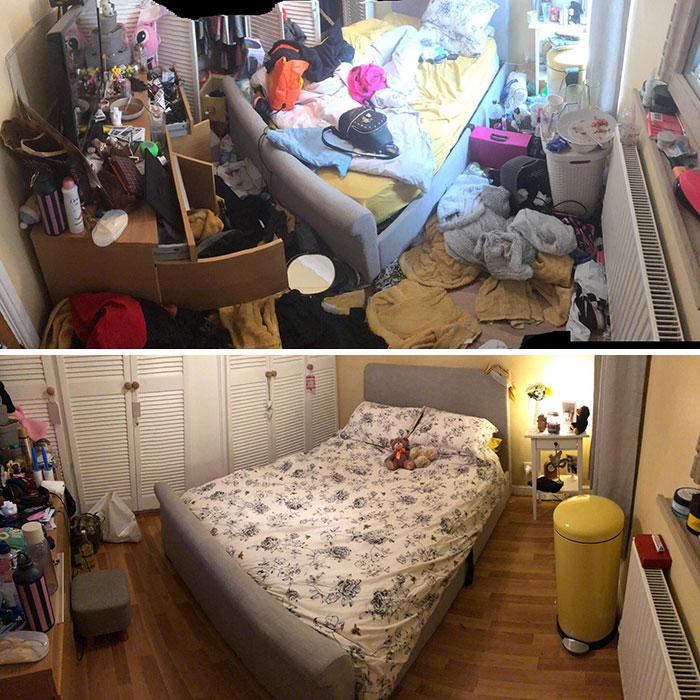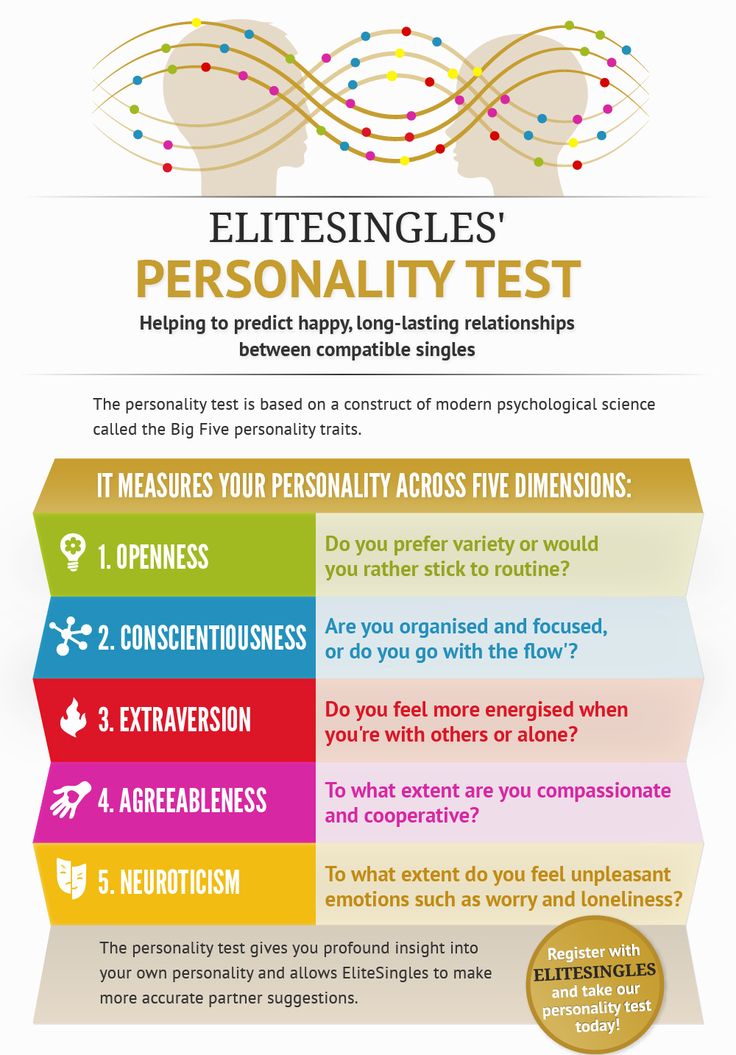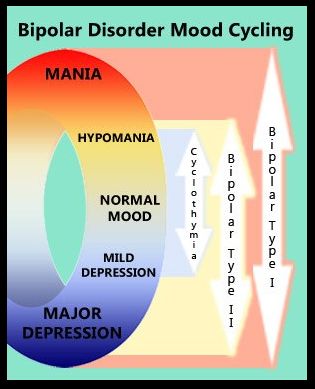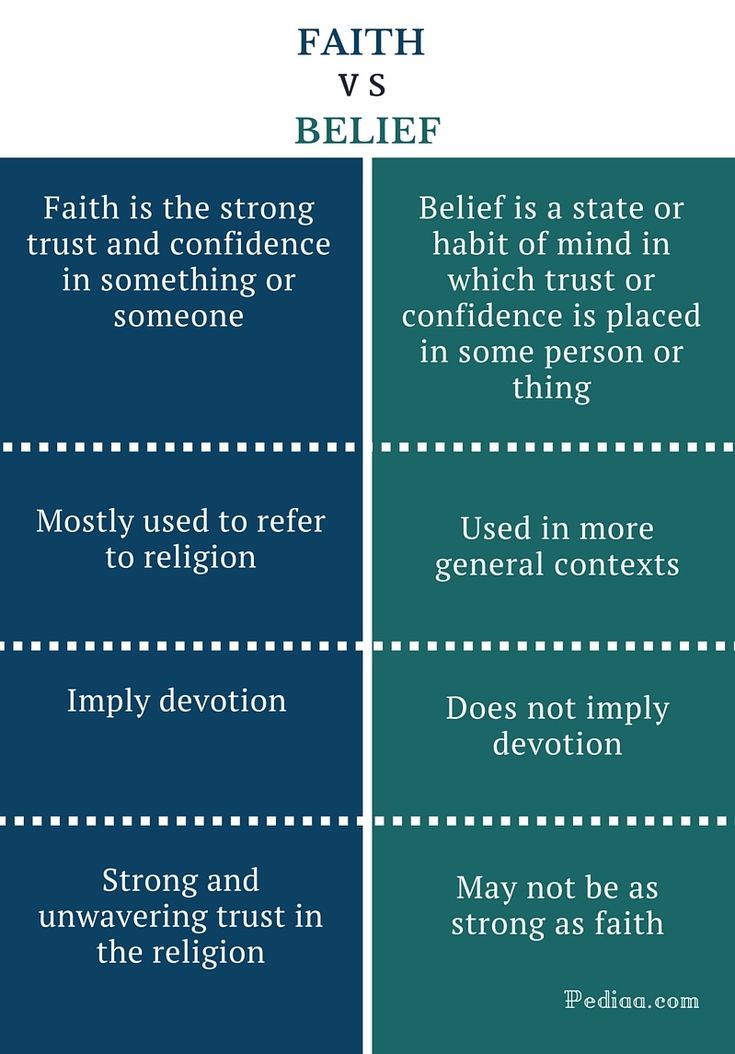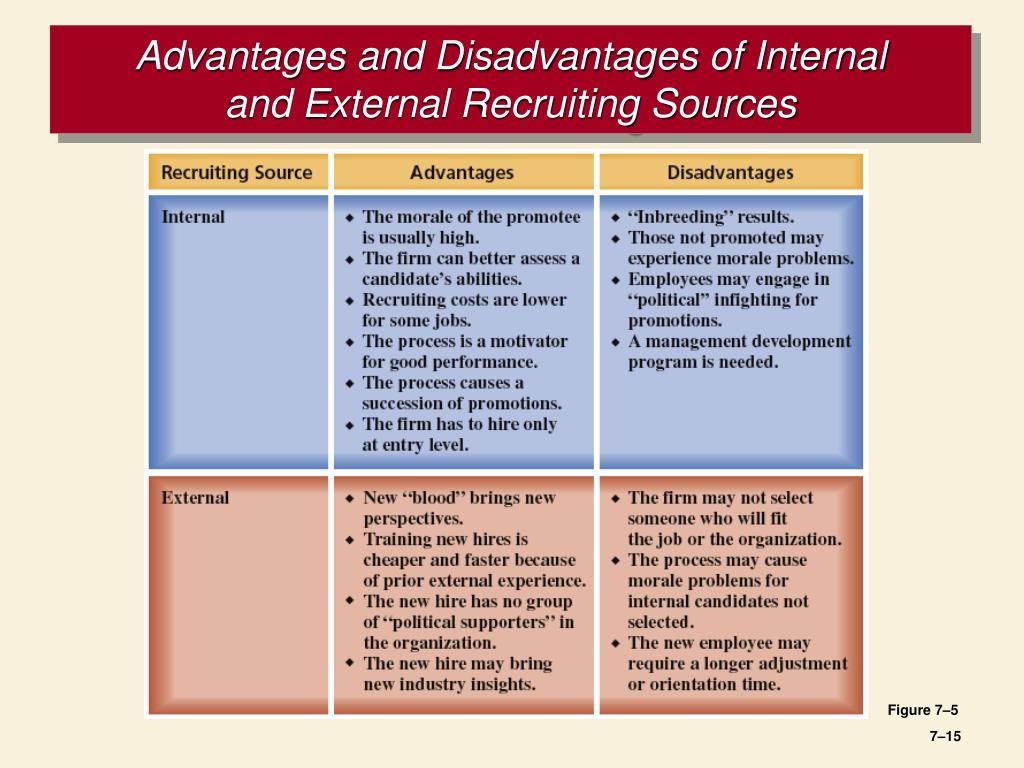Depression room clean
20 Tips on Cleaning a Depression Nest
The term “depression nest” has become more popular since the pandemic began. This is a messy and disorganized room or home as a result of experiencing depression. It is an outward display of a depressed mental state. This is a type of situational disorganization, where a life situation, in this case depression, has caused someone to put off the regular maintenance of cleaning and organizing their environment.
If someone is depressed, cleaning and organizing won’t solve that depression. I recommend reaching out to friends, family or mental health professionals to help. However, cleaning, decluttering and organizing can help you take control of your environment and improve your surroundings, which may lower feelings of stress, anxiety and depression.
Sometimes, my work as a professional organizer has me cleaning up a “depression nest” with a motivated client who’s working to overcome paralyzing and overwhelming feelings to improve their space and quality of life. This person may feel guilty or embarrassed about letting the room or home get to this messy state, but there is no need to feel that way. Depression can bring on fatigue, lethargy, and difficulty focusing, and it is tough to stay organized in that situation. I’m there to help my clients in a nonjudgmental way to turn their space into something they can be proud of and enjoy.
Do not have a judgmental family member or friend help you. This person may be well-meaning, but if they can’t accept the current state of your space and assist you without judging, then it is best to tackle this on your own, or with help of a professional organizer.
Schedule a time when you have the most energy to take on this task. For example, if you’re an early bird, plan a time to focus on this in the mornings, when you have the most energy.
Eat beforehand, and stay well-hydrated. It is difficult to focus when you’re hungry or thirsty.
Play music in the background. Do this only if music helps to motivate you, and doesn’t distract you.
Do this only if music helps to motivate you, and doesn’t distract you.
Let light into the room. Open the blinds and turn on overhead lights before starting.
Take a before photo or video. This is so you can see the transformation you’ve made once done, and feel good about what you’ve accomplished.
Gather the basic sorting and cleaning tools before you start. Have the following tools nearby: empty boxes for items to sell, donate or to move to other rooms, trash bags, recycling bins, laundry baskets, and cleaning supplies like a broom, vacuum, disinfectant wipes and gloves. If your space is too cramped at the start, set up a folding table in a hallway or other room for a sorting area.
Start with the space that is most important to you. The space that usually makes the most difference in the quality of your life is where you sleep. If your bedroom is the first thing you see when you wake up, and the last thing you see at the end of your day, focus on your bedroom first, before going to other rooms.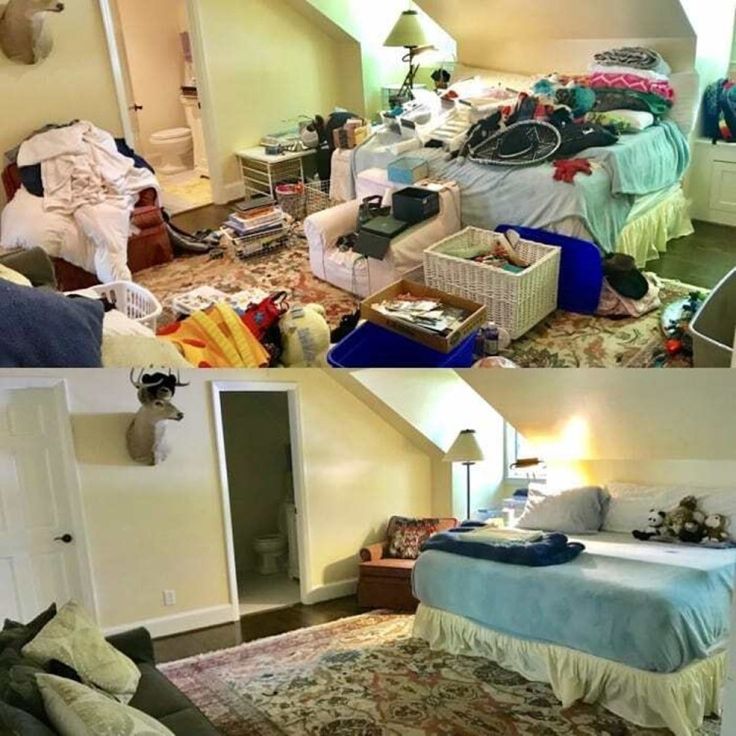
Begin with clearing the floor space. Creating a safe space to walk around the furniture should be your first goal.
Next, focus on picking up obvious trash. Clear out any definite trash with your first sweep of the room, gathering, empty bags, wrappers, bottles, etc.
Separate items by type. In bedrooms, you may have categories such as paper, books, electronics, clothing, shoes, jewelry, make-up, keepsakes, luggage, etc. Clothing is usually the largest category, so pile all clothes in one area, and go through those after the floor-space has cleared.
Plan to do laundry. Load up all dirty laundry in baskets, hampers or bags and move them out of the room. Be prepared to wash clothing after this clean-out, so schedule a time to go to a laundromat to do it all at once, or plan to do many loads of laundry in your home.
Focus on organizing after you’ve removed excess items. Once you’ve removed trash, recycling, dirty laundry, and items that need to go to other rooms (for example, dishes to go to the kitchen), or things you want to donate, you can then focus on how to organize what remains.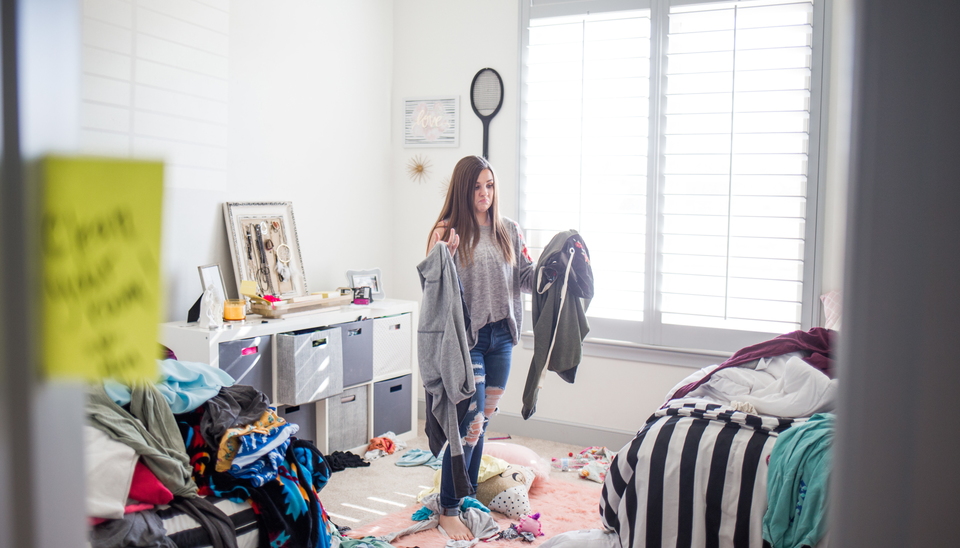
Sort through the visible surfaces. Focus on clearing the tops of dressers, tables and other furniture.
Sort through closed storage areas. Next, sort through each drawer, cabinet, box, etc.
Focus on closets last. Eventually, move into organizing the closet, once the main bedroom has some space.
Tackle this in small increments of time. I suggest anywhere from 1 to 3 hours at a time, and understand that it may take more than one day.
Rest in between, and take breaks as needed. You’re doing a lot of emotional and physical work, so remember to take breaks!
Take an after photo or video. If you feel like it, share your accomplishment with others as inspiration. Be proud of this transformation of your environment!
Make a plan for maintenance. Once you’ve decluttered and cleaned up your “depression nest,” make a list of the daily and weekly tasks you need to do to keep it that way. For example, putting dirty laundry in a hamper, washing clothes, putting away clean laundry, taking out trash, bringing dirty dishes to kitchen, filing, recycling, or shredding of mail and papers, sweeping or vacuuming, etc.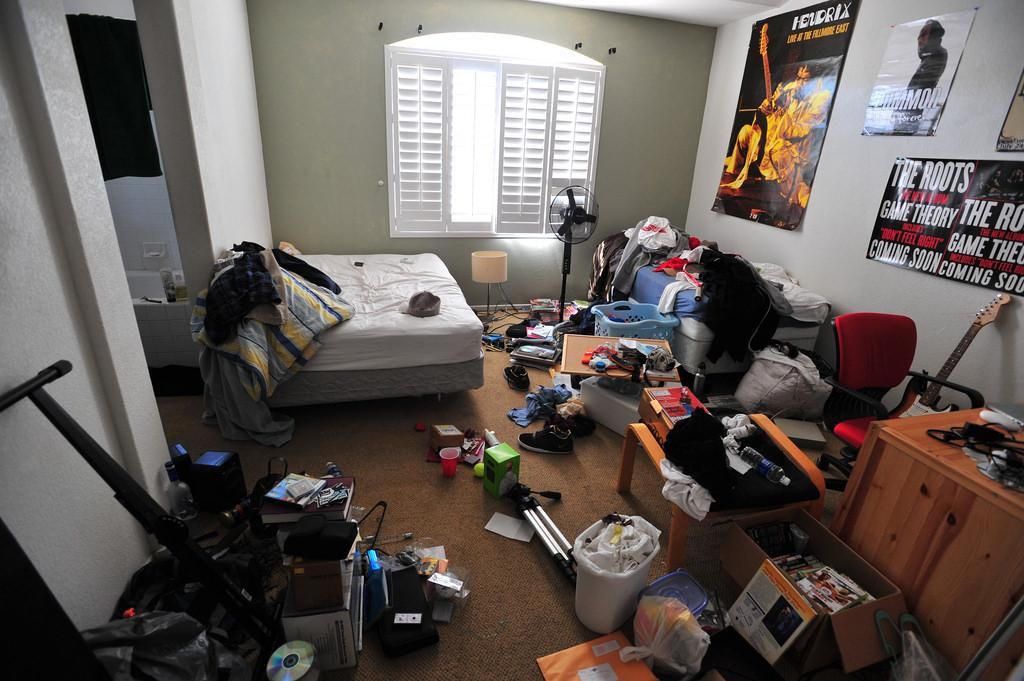 Schedule a time to do these tasks regularly. Even 10 minutes a day can help maintain a clean room.
Schedule a time to do these tasks regularly. Even 10 minutes a day can help maintain a clean room.
Once your bedroom “depression nest” is taken care of, you can focus on other parts of your home, one space at a time. Make a goal going forward to always keep your bedroom as your sanctuary, an environment that you want to wake up to every day.
Unfuck Your Habitat
- - - - - - - - - - - - - - - - - - - - - - - - - - - - - - - - - - - - - - - - - - - - - - - - - - - - - - - - - - - - - - - - - - - - - - - - - - - - - - - - - - - - - - - - - - - - - -
When I first started UfYH, it was a housekeeping blog very squarely aimed at lazy people. Mostly because I am one. As the blog gained momentum, though, I started hearing from people who were using the fundamentals to help them battle through something more serious than laziness: mental illness. More specifically, depression.
Mostly because I am one. As the blog gained momentum, though, I started hearing from people who were using the fundamentals to help them battle through something more serious than laziness: mental illness. More specifically, depression.
Now, I’m no stranger to depression. I don’t make it a secret that I have issues with depression and anxiety, just like I don’t make it a secret that I have poor eyesight and a bum knee. Depression, however, has its own set of related life issues that my poor arthritic knee has never caused. And one of those is the self-perpetuating cycle of depression and a messy home.
When you’re in the midst of a depressive episode, cleaning your house comes in on the List of Things You Want to Do somewhere after taunting a hive of bees and tap dancing on live television. Things are awful. It’s a struggle to walk to the bathroom. Making dinner seems more impossible than advanced calculus. Anything that’s not your couch or your bed might as well be hot lava. And so the mess builds around you. I purposely use the passive voice there because when you’re depressed, it seems nearly impossible that you’re contributing to the chaos of your house, because that would require energy, and you sure as hell don’t have any of that to spare.
And so the mess builds around you. I purposely use the passive voice there because when you’re depressed, it seems nearly impossible that you’re contributing to the chaos of your house, because that would require energy, and you sure as hell don’t have any of that to spare.
Then you look around your messy house. And you feel worse. You feel more depressed, because now you’re exhausted and hopeless and can’t pull yourself out of bed, and on top of that, your house is a shithole. Which makes you feel useless on top of everything you were already feeling, and then probably overwhelmed on top of that, and quite frankly, having that many feelings at once during a depressive episode is like being crushed by a ton of bricks. So your depression gets worse, and your mess gets worse, and the two keep feeding on each other and it seems like there’s no end in sight.
Here’s the thing: you can interrupt that cycle. It’s difficult to imagine, and it requires a shift in thinking, because when you’re depressed, you’re looking at big-picture stuff. And you sure as shit aren’t going to be able to clean your whole house, so why even bother, right? Wrong.
And you sure as shit aren’t going to be able to clean your whole house, so why even bother, right? Wrong.
Take five minutes. Just five. Set a timer. If you’re on the couch or in bed, look to see the closest surface to you. It’s probably the coffee table or your nightstand. For those five minutes, just focus on that one surface. Clear it off, throw stuff away, maybe even dust it. So when your five minutes is done and you’re back in bed, you have one clear surface to look at. You have an accomplishment to focus on. You did something. You don’t have to do everything.
In fact, you shouldn’t do everything. On the flip side of depression, we have manic episodes. For many people, myself included, manic episodes often manifest as cleaning marathons. While you might think this is a great thing, because, hey, clean house!, manic marathons can be damaging in a number of ways. You’re exhausted at the end of it, what you’ve accomplished isn’t sustainable because you’re not doing any maintenance on the mess, you’re just whirlwind-ing your way through it, and your brain, on some level, associates cleaning with being sick.
So, five minutes. That seems easy enough, right? No? It seems completely impossible and unreasonable? I understand. No, seriously, I do. But just try giving me five minutes. And make sure you stop at the end of it. Who knows? You might feel so energized by having one clean surface that you want to keep going, and that’s great. But not right away. In an hour. Or tomorrow. Give yourself plenty of time to take a break. The only expectation you should have is getting through those five minutes, and having one surface cleaner at the end of it than it started out.
The one thing I hear over and over again from members of Team UfYH about their depression is that these tiny accomplishments give them something to be proud of. Something to be positive about. Something that reminds them that they deserve better, and that they’re the ones who can make that happen. Shifting your thinking for just five minutes, knowing that it’s this tiny little moment of time, can be enough to reach in and interrupt that cycle.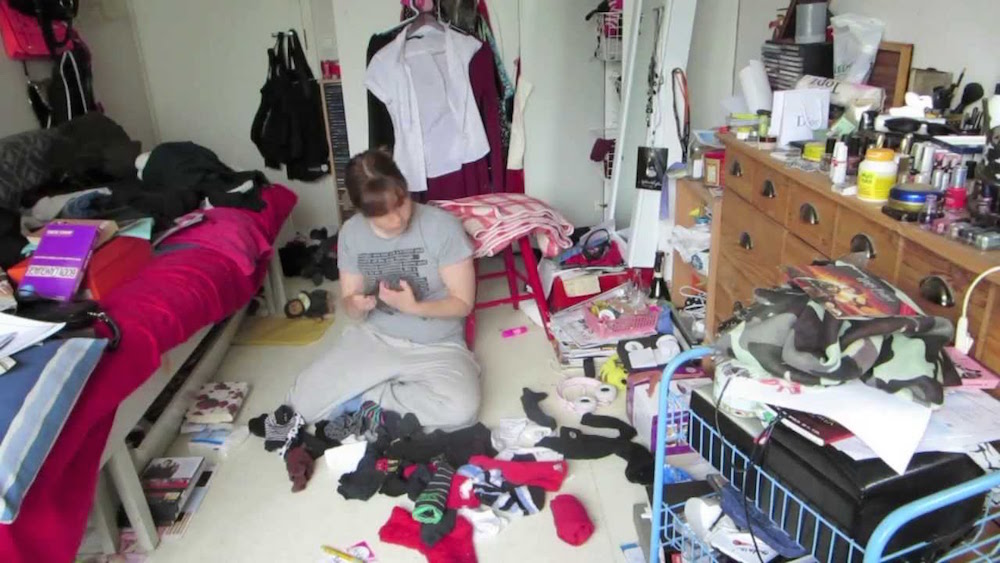 Don’t misunderstand me: cleaning your house is not going to cure your depression. But depression and a messy home don’t have to go together. You can accomplish something. One surface is a pretty big deal. It’s change. It’s positive change. And it might help lead to more.
Don’t misunderstand me: cleaning your house is not going to cure your depression. But depression and a messy home don’t have to go together. You can accomplish something. One surface is a pretty big deal. It’s change. It’s positive change. And it might help lead to more.
You can do five minutes. I promise.
[Author’s note: I am not an expert on anything, least of all health or mental health. Nothing in this post is intended to replace proper medical care. Please keep yourselves healthy.]
Toggle Content list
All Articles
- - - - - - - - - - - - - - - - - - - - - - - - - - - - - - - - - - - - - - - - - - - - - - - - - - - - - - - - - - - - - - - - - - - - - - - - - - - - - - - - - - - - - - - - - - - - - -
So, you're moving. Fun! No, wait. The opposite of that. Moving sucks, but there are things you can do to make it suck maybe a little less.
- - - - - - - - - - - - - - - - - - - - - - - - - - - - - - - - - - - - - - - - - - - - - - - - - - - - - - - - - - - - - - - - - - - - - - - - - - - - - - - - - - - - - - - - - - - - - -
- - - - - - - - - - - - - - - - - - - - - - - - - - - - - - - - - - - - - - - - - - - - - - - - - - - - - - - - - - - - - - - - - - - - - - - - - - - - - - - - - - - - - - - - - - - - - -
- - - - - - - - - - - - - - - - - - - - - - - - - - - - - - - - - - - - - - - - - - - - - - - - - - - - - - - - - - - - - - - - - - - - - - - - - - - - - - - - - - - - - - - - - - - - - -
- - - - - - - - - - - - - - - - - - - - - - - - - - - - - - - - - - - - - - - - - - - - - - - - - - - - - - - - - - - - - - - - - - - - - - - - - - - - - - - - - - - - - - - - - - - - - -
- - - - - - - - - - - - - - - - - - - - - - - - - - - - - - - - - - - - - - - - - - - - - - - - - - - - - - - - - - - - - - - - - - - - - - - - - - - - - - - - - - - - - - - - - - - - - -
- - - - - - - - - - - - - - - - - - - - - - - - - - - - - - - - - - - - - - - - - - - - - - - - - - - - - - - - - - - - - - - - - - - - - - - - - - - - - - - - - - - - - - - - - - - - - -
- - - - - - - - - - - - - - - - - - - - - - - - - - - - - - - - - - - - - - - - - - - - - - - - - - - - - - - - - - - - - - - - - - - - - - - - - - - - - - - - - - - - - - - - - - - - - -
- - - - - - - - - - - - - - - - - - - - - - - - - - - - - - - - - - - - - - - - - - - - - - - - - - - - - - - - - - - - - - - - - - - - - - - - - - - - - - - - - - - - - - - - - - - - - -
OH MY GOD THE PILES OF MAIL.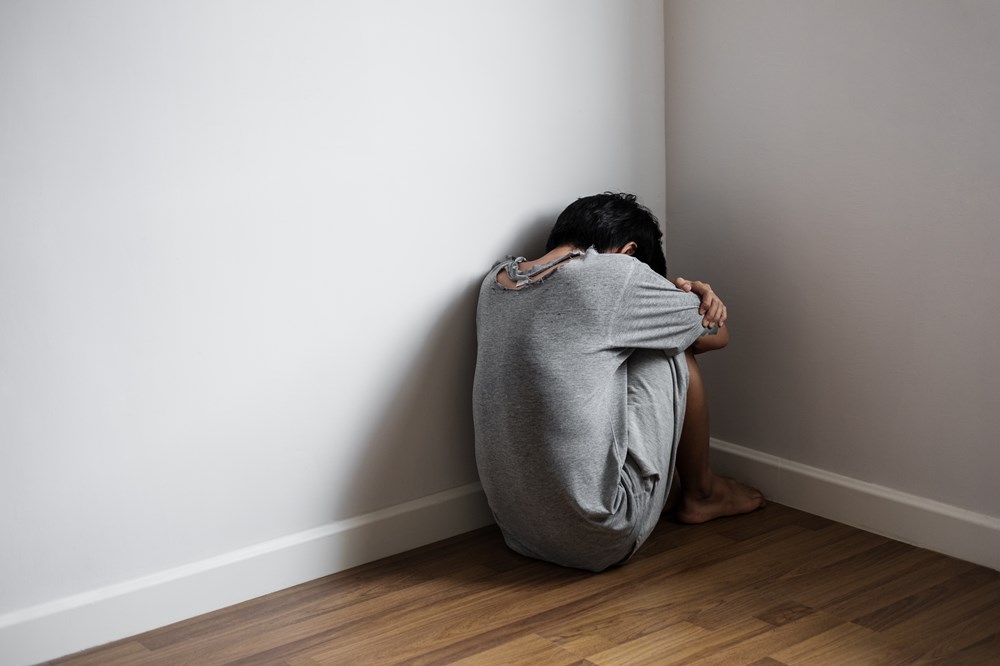 …
…
Read more
- - - - - - - - - - - - - - - - - - - - - - - - - - - - - - - - - - - - - - - - - - - - - - - - - - - - - - - - - - - - - - - - - - - - - - - - - - - - - - - - - - - - - - - - - - - - - -
Wash out those slobbery food and water dishes, and wipe down the area where your pets get fed, including any cabinet or wall surfaces that may get accidental splatter mess.…
Read more
- - - - - - - - - - - - - - - - - - - - - - - - - - - - - - - - - - - - - - - - - - - - - - - - - - - - - - - - - - - - - - - - - - - - - - - - - - - - - - - - - - - - - - - - - - - - - -
- - - - - - - - - - - - - - - - - - - - - - - - - - - - - - - - - - - - - - - - - - - - - - - - - - - - - - - - - - - - - - - - - - - - - - - - - - - - - - - - - - - - - - - - - - - - - -
- - - - - - - - - - - - - - - - - - - - - - - - - - - - - - - - - - - - - - - - - - - - - - - - - - - - - - - - - - - - - - - - - - - - - - - - - - - - - - - - - - - - - - - - - - - - - -
- - - - - - - - - - - - - - - - - - - - - - - - - - - - - - - - - - - - - - - - - - - - - - - - - - - - - - - - - - - - - - - - - - - - - - - - - - - - - - - - - - - - - - - - - - - - - -
- - - - - - - - - - - - - - - - - - - - - - - - - - - - - - - - - - - - - - - - - - - - - - - - - - - - - - - - - - - - - - - - - - - - - - - - - - - - - - - - - - - - - - - - - - - - - -
- - - - - - - - - - - - - - - - - - - - - - - - - - - - - - - - - - - - - - - - - - - - - - - - - - - - - - - - - - - - - - - - - - - - - - - - - - - - - - - - - - - - - - - - - - - - - -
- - - - - - - - - - - - - - - - - - - - - - - - - - - - - - - - - - - - - - - - - - - - - - - - - - - - - - - - - - - - - - - - - - - - - - - - - - - - - - - - - - - - - - - - - - - - - -
- - - - - - - - - - - - - - - - - - - - - - - - - - - - - - - - - - - - - - - - - - - - - - - - - - - - - - - - - - - - - - - - - - - - - - - - - - - - - - - - - - - - - - - - - - - - - -
- - - - - - - - - - - - - - - - - - - - - - - - - - - - - - - - - - - - - - - - - - - - - - - - - - - - - - - - - - - - - - - - - - - - - - - - - - - - - - - - - - - - - - - - - - - - - -
- - - - - - - - - - - - - - - - - - - - - - - - - - - - - - - - - - - - - - - - - - - - - - - - - - - - - - - - - - - - - - - - - - - - - - - - - - - - - - - - - - - - - - - - - - - - - -
- - - - - - - - - - - - - - - - - - - - - - - - - - - - - - - - - - - - - - - - - - - - - - - - - - - - - - - - - - - - - - - - - - - - - - - - - - - - - - - - - - - - - - - - - - - - - -
- - - - - - - - - - - - - - - - - - - - - - - - - - - - - - - - - - - - - - - - - - - - - - - - - - - - - - - - - - - - - - - - - - - - - - - - - - - - - - - - - - - - - - - - - - - - - -
- - - - - - - - - - - - - - - - - - - - - - - - - - - - - - - - - - - - - - - - - - - - - - - - - - - - - - - - - - - - - - - - - - - - - - - - - - - - - - - - - - - - - - - - - - - - - -
- - - - - - - - - - - - - - - - - - - - - - - - - - - - - - - - - - - - - - - - - - - - - - - - - - - - - - - - - - - - - - - - - - - - - - - - - - - - - - - - - - - - - - - - - - - - - -
- - - - - - - - - - - - - - - - - - - - - - - - - - - - - - - - - - - - - - - - - - - - - - - - - - - - - - - - - - - - - - - - - - - - - - - - - - - - - - - - - - - - - - - - - - - - - -
- - - - - - - - - - - - - - - - - - - - - - - - - - - - - - - - - - - - - - - - - - - - - - - - - - - - - - - - - - - - - - - - - - - - - - - - - - - - - - - - - - - - - - - - - - - - - -
- - - - - - - - - - - - - - - - - - - - - - - - - - - - - - - - - - - - - - - - - - - - - - - - - - - - - - - - - - - - - - - - - - - - - - - - - - - - - - - - - - - - - - - - - - - - - -
- - - - - - - - - - - - - - - - - - - - - - - - - - - - - - - - - - - - - - - - - - - - - - - - - - - - - - - - - - - - - - - - - - - - - - - - - - - - - - - - - - - - - - - - - - - - - -
- - - - - - - - - - - - - - - - - - - - - - - - - - - - - - - - - - - - - - - - - - - - - - - - - - - - - - - - - - - - - - - - - - - - - - - - - - - - - - - - - - - - - - - - - - - - - -
- - - - - - - - - - - - - - - - - - - - - - - - - - - - - - - - - - - - - - - - - - - - - - - - - - - - - - - - - - - - - - - - - - - - - - - - - - - - - - - - - - - - - - - - - - - - - -
- - - - - - - - - - - - - - - - - - - - - - - - - - - - - - - - - - - - - - - - - - - - - - - - - - - - - - - - - - - - - - - - - - - - - - - - - - - - - - - - - - - - - - - - - - - - - -
- - - - - - - - - - - - - - - - - - - - - - - - - - - - - - - - - - - - - - - - - - - - - - - - - - - - - - - - - - - - - - - - - - - - - - - - - - - - - - - - - - - - - - - - - - - - - -
- - - - - - - - - - - - - - - - - - - - - - - - - - - - - - - - - - - - - - - - - - - - - - - - - - - - - - - - - - - - - - - - - - - - - - - - - - - - - - - - - - - - - - - - - - - - - -
- - - - - - - - - - - - - - - - - - - - - - - - - - - - - - - - - - - - - - - - - - - - - - - - - - - - - - - - - - - - - - - - - - - - - - - - - - - - - - - - - - - - - - - - - - - - - -
- - - - - - - - - - - - - - - - - - - - - - - - - - - - - - - - - - - - - - - - - - - - - - - - - - - - - - - - - - - - - - - - - - - - - - - - - - - - - - - - - - - - - - - - - - - - - -
(For Parents and Adult Children)
- - - - - - - - - - - - - - - - - - - - - - - - - - - - - - - - - - - - - - - - - - - - - - - - - - - - - - - - - - - - - - - - - - - - - - - - - - - - - - - - - - - - - - - - - - - - - -
- - - - - - - - - - - - - - - - - - - - - - - - - - - - - - - - - - - - - - - - - - - - - - - - - - - - - - - - - - - - - - - - - - - - - - - - - - - - - - - - - - - - - - - - - - - - - -
- - - - - - - - - - - - - - - - - - - - - - - - - - - - - - - - - - - - - - - - - - - - - - - - - - - - - - - - - - - - - - - - - - - - - - - - - - - - - - - - - - - - - - - - - - - - - -
- - - - - - - - - - - - - - - - - - - - - - - - - - - - - - - - - - - - - - - - - - - - - - - - - - - - - - - - - - - - - - - - - - - - - - - - - - - - - - - - - - - - - - - - - - - - - -
- - - - - - - - - - - - - - - - - - - - - - - - - - - - - - - - - - - - - - - - - - - - - - - - - - - - - - - - - - - - - - - - - - - - - - - - - - - - - - - - - - - - - - - - - - - - - -
- - - - - - - - - - - - - - - - - - - - - - - - - - - - - - - - - - - - - - - - - - - - - - - - - - - - - - - - - - - - - - - - - - - - - - - - - - - - - - - - - - - - - - - - - - - - - -
- - - - - - - - - - - - - - - - - - - - - - - - - - - - - - - - - - - - - - - - - - - - - - - - - - - - - - - - - - - - - - - - - - - - - - - - - - - - - - - - - - - - - - - - - - - - - -
- - - - - - - - - - - - - - - - - - - - - - - - - - - - - - - - - - - - - - - - - - - - - - - - - - - - - - - - - - - - - - - - - - - - - - - - - - - - - - - - - - - - - - - - - - - - - -
- - - - - - - - - - - - - - - - - - - - - - - - - - - - - - - - - - - - - - - - - - - - - - - - - - - - - - - - - - - - - - - - - - - - - - - - - - - - - - - - - - - - - - - - - - - - - -
- - - - - - - - - - - - - - - - - - - - - - - - - - - - - - - - - - - - - - - - - - - - - - - - - - - - - - - - - - - - - - - - - - - - - - - - - - - - - - - - - - - - - - - - - - - - - -
- - - - - - - - - - - - - - - - - - - - - - - - - - - - - - - - - - - - - - - - - - - - - - - - - - - - - - - - - - - - - - - - - - - - - - - - - - - - - - - - - - - - - - - - - - - - - -
- - - - - - - - - - - - - - - - - - - - - - - - - - - - - - - - - - - - - - - - - - - - - - - - - - - - - - - - - - - - - - - - - - - - - - - - - - - - - - - - - - - - - - - - - - - - - -
- - - - - - - - - - - - - - - - - - - - - - - - - - - - - - - - - - - - - - - - - - - - - - - - - - - - - - - - - - - - - - - - - - - - - - - - - - - - - - - - - - - - - - - - - - - - - -
- - - - - - - - - - - - - - - - - - - - - - - - - - - - - - - - - - - - - - - - - - - - - - - - - - - - - - - - - - - - - - - - - - - - - - - - - - - - - - - - - - - - - - - - - - - - - -
- - - - - - - - - - - - - - - - - - - - - - - - - - - - - - - - - - - - - - - - - - - - - - - - - - - - - - - - - - - - - - - - - - - - - - - - - - - - - - - - - - - - - - - - - - - - - -
- - - - - - - - - - - - - - - - - - - - - - - - - - - - - - - - - - - - - - - - - - - - - - - - - - - - - - - - - - - - - - - - - - - - - - - - - - - - - - - - - - - - - - - - - - - - - -
- - - - - - - - - - - - - - - - - - - - - - - - - - - - - - - - - - - - - - - - - - - - - - - - - - - - - - - - - - - - - - - - - - - - - - - - - - - - - - - - - - - - - - - - - - - - - -
- - - - - - - - - - - - - - - - - - - - - - - - - - - - - - - - - - - - - - - - - - - - - - - - - - - - - - - - - - - - - - - - - - - - - - - - - - - - - - - - - - - - - - - - - - - - - -
- - - - - - - - - - - - - - - - - - - - - - - - - - - - - - - - - - - - - - - - - - - - - - - - - - - - - - - - - - - - - - - - - - - - - - - - - - - - - - - - - - - - - - - - - - - - - -
- - - - - - - - - - - - - - - - - - - - - - - - - - - - - - - - - - - - - - - - - - - - - - - - - - - - - - - - - - - - - - - - - - - - - - - - - - - - - - - - - - - - - - - - - - - - - -
- - - - - - - - - - - - - - - - - - - - - - - - - - - - - - - - - - - - - - - - - - - - - - - - - - - - - - - - - - - - - - - - - - - - - - - - - - - - - - - - - - - - - - - - - - - - - -
- - - - - - - - - - - - - - - - - - - - - - - - - - - - - - - - - - - - - - - - - - - - - - - - - - - - - - - - - - - - - - - - - - - - - - - - - - - - - - - - - - - - - - - - - - - - - -
- - - - - - - - - - - - - - - - - - - - - - - - - - - - - - - - - - - - - - - - - - - - - - - - - - - - - - - - - - - - - - - - - - - - - - - - - - - - - - - - - - - - - - - - - - - - - -
- - - - - - - - - - - - - - - - - - - - - - - - - - - - - - - - - - - - - - - - - - - - - - - - - - - - - - - - - - - - - - - - - - - - - - - - - - - - - - - - - - - - - - - - - - - - - -
- - - - - - - - - - - - - - - - - - - - - - - - - - - - - - - - - - - - - - - - - - - - - - - - - - - - - - - - - - - - - - - - - - - - - - - - - - - - - - - - - - - - - - - - - - - - - -
- - - - - - - - - - - - - - - - - - - - - - - - - - - - - - - - - - - - - - - - - - - - - - - - - - - - - - - - - - - - - - - - - - - - - - - - - - - - - - - - - - - - - - - - - - - - - -
- - - - - - - - - - - - - - - - - - - - - - - - - - - - - - - - - - - - - - - - - - - - - - - - - - - - - - - - - - - - - - - - - - - - - - - - - - - - - - - - - - - - - - - - - - - - - -
- - - - - - - - - - - - - - - - - - - - - - - - - - - - - - - - - - - - - - - - - - - - - - - - - - - - - - - - - - - - - - - - - - - - - - - - - - - - - - - - - - - - - - - - - - - - - -
- - - - - - - - - - - - - - - - - - - - - - - - - - - - - - - - - - - - - - - - - - - - - - - - - - - - - - - - - - - - - - - - - - - - - - - - - - - - - - - - - - - - - - - - - - - - - -
- - - - - - - - - - - - - - - - - - - - - - - - - - - - - - - - - - - - - - - - - - - - - - - - - - - - - - - - - - - - - - - - - - - - - - - - - - - - - - - - - - - - - - - - - - - - - -
- - - - - - - - - - - - - - - - - - - - - - - - - - - - - - - - - - - - - - - - - - - - - - - - - - - - - - - - - - - - - - - - - - - - - - - - - - - - - - - - - - - - - - - - - - - - - -
What an untidy room says about you — News
News Editor 10/01/2019 lifestyle 2,132 views
Have you ever dreamed of living in perfectly clean and organized rooms in a home decor catalog? Or would you rather spend time in a room filled with objects, souvenirs, books, art and items that make up your daily life?
For some people, a neatly tidy room can be soothing.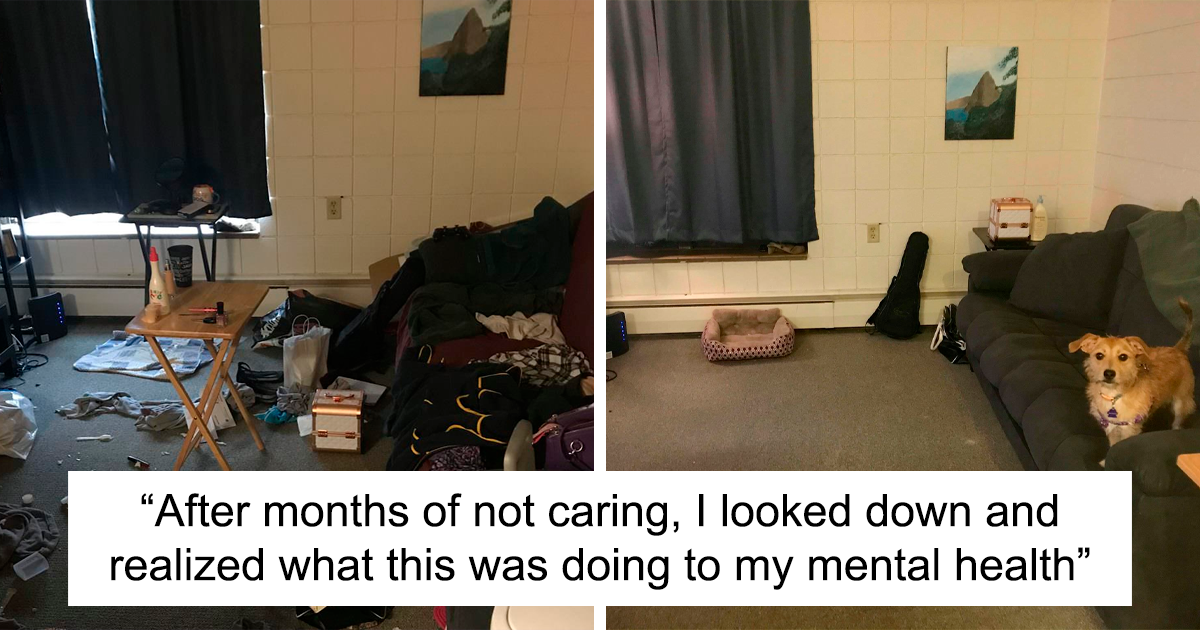 An orderly retreat in an often chaotic world. For others, such rooms can be sterile, bland, and boring.
An orderly retreat in an often chaotic world. For others, such rooms can be sterile, bland, and boring.
Organization is big business these days. Everyone, from books to seminars to organizational systems, seems to want to find a way to perfectly organize every aspect of their lives.
Disorder has long been regarded as something of a character flaw or a sign of laziness. Cleanliness and organization are presented as an ideal - both a sign and a path to success.
But what about those that are a little dirty or more messy? What does an untidy room say about you? What exactly is behind the dirty room in psychology?
Mental health
Having a dirty room can be the result of many factors. This may mean that you are busy and have little time to clean and organize. This may be a sign that you have too many things. Or it could be the result of small children in the home who usually don't have the motivation to clean up after themselves.
But if your room is just untidy, does it tell you about your mental health?
In some cases, the state of your room may be related to your mental state. For example, people with OCD may be so preoccupied with keeping things clean that any amount of clutter can become a significant source of anxiety. In other cases, people hoard items to such an extent that they cannot part with even the most trivial items. Their homes are filled with useless items over the years, from old newspapers to plastic containers.
For example, people with OCD may be so preoccupied with keeping things clean that any amount of clutter can become a significant source of anxiety. In other cases, people hoard items to such an extent that they cannot part with even the most trivial items. Their homes are filled with useless items over the years, from old newspapers to plastic containers.
Mess can be normal
Are you used to clutter?
Some people simply don't prioritize keeping everything clean and organized and in its place.
In this case, disorder is just the normal state of things. If the house is cluttered and you're fine, then it's probably more of a sign of your personality and preferences.
Mess out of feeling overwhelmed
Does clutter bother you?
If you are frustrated, angry, or overwhelmed by the mess, then this is a clear sign that something needs to be addressed.
Clutter can sometimes be frustrating, but figuring out where to start and how to fix a problem can feel overwhelming.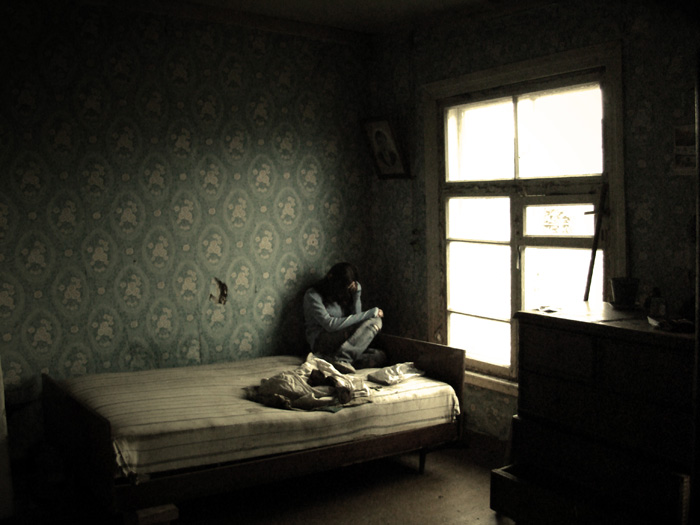
This could mean eliminating things, learning new organizational tactics, or getting other family members involved in cleaning.
Clutter as a sign of depression
Is an untidy room something new and unusual? If you tend to be tidy and organized, the sudden lack of care in a messy room could be a sign that something is going wrong in your life. For example, confusion can sometimes be a sign of depression.
Depressed people often feel too tired or hopeless to keep up with routine household chores.
Depression can also make it difficult to focus and energy to clean the room.
If you suspect that your messy room may be a sign of problems in your life or the result of depression, don't be afraid to reach out. Talk to your doctor about what's going on, or consult with a mental health professional for specific advice for your situation. A counselor, therapist, or doctor can help you get to the bottom of what's going on and help you develop an action plan to deal with the problem.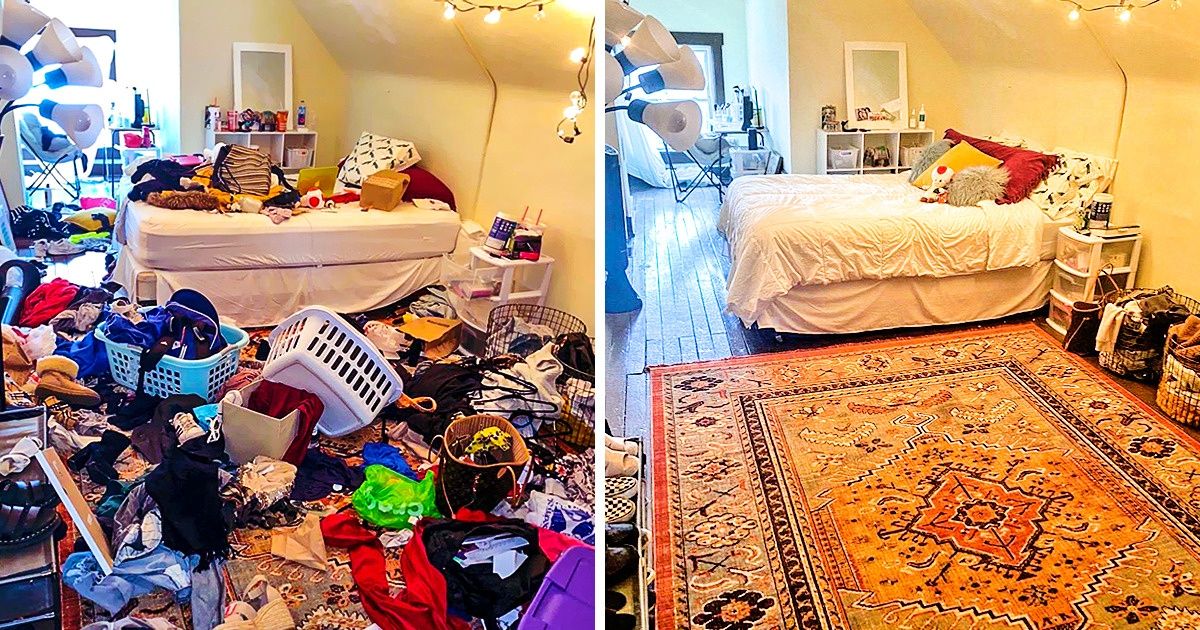
Personality
So what distinguishes neat people from unscrupulous people?
While some may suggest that a cluttered room is a sign of a cluttered mind, those who prefer this type of environment are not necessarily disorganized. Their desks may look like a mess, littered with papers, envelopes, and files. However, they always seem to know exactly where each item is when they need it. The famous psychoanalyst Sigmund Freud once said, “Don't clean up the mess. I know exactly where everything is."
In fact, some people seem to thrive in such an environment. Some of the most creative and productive people seem to be incurable sloths.
If you tend to be more relaxed in your approach to housekeeping and cleaning, this may mean that you have more of a Type B personality. People with this personality type are more relaxed than their Type A counterparts. Instead of focusing on achieve excellence, they are more attracted to ideas, experience and creativity.
Benefits of disorder
And there are studies that support the idea that disorder also has its benefits. Researchers have found that by working in a tidy environment, encouraging behaviors such as generosity and healthy eating, working in a messy environment actually leads to more creativity.
Increasing generosity
In the study, participants were asked to complete questionnaires in a room. For some participants the room was very clean and organized. As for the other subjects, they filled out the questionnaire in a very messy, unorganized space.
As they left the room, participants were presented with several options. They were first asked if they wanted to donate money to charity. Then they were offered a snack: either an apple or a chocolate bar. Those who took the survey in a tidy room were more likely to donate more of their money to charity. They were also more likely to choose an apple over a chocolate bar.
Increased creativity
Researchers believe that doing work in a clean and tidy environment activates social norms that encourage people to do what is expected of them. Working in a dirty space, on the other hand, relaxes the needy and allows people to break out of social norms and expectations.
Working in a dirty space, on the other hand, relaxes the needy and allows people to break out of social norms and expectations.
In a separate experiment, participants were again placed in clean or dirty rooms and then asked to complete a task that included finding new uses for ping-pong balls. Unbiased judges rated the participants in the messy room state as coming up with more creative and innovative ideas than those in the clean room.
Such insights can have implications for the design of workspaces, especially for professions that require a lot of innovation and creativity. Employers may be encouraged to allow their employees to design and build workplaces that are more personal, even if that means they may be less tidy.
Obviously, as the researchers explain, this does not necessarily mean that everyone exposed to a dirty environment will become more creative. Some people tend to work better in highly organized spaces, while others work better in less organized environments. Personality and preferences are what play an important role in such situations.
Personality and preferences are what play an important role in such situations.
For example, forcing a person who prefers a neat place to work in a messy environment can actually lead to less creativity and less productivity. And jobs that focus on efficiency and quick decision making might be better suited to tidy workspaces, while those that rely on creativity might be better suited to less tidy spaces.
So while order may be the most desirable quality, research has also shown that disorder has some advantages. If you tend to have a messy room, here are some possible benefits backed by psychology research.
One study showed that people in a messy room were able to solve puzzles faster than those in an organized room. Scientist Albert Einstein, known for his genius and creative thinking, was famous for having a messy desk. “If a cluttered desk is a sign of a cluttered mind, then what should we think of an empty desk?” he once asked in response to comments on his workspace.
The results show that people in neat and tidy environments are more likely to stick with the classics and the usual, common options, while people in messy environments are more likely to prefer novelty.
While minimalism can be trendy, it can also crush your creativity. If keeping your desk or room clean is more stressful for you than the clutter itself, try to relax a bit, live with the clutter and see if that helps you unleash your creativity.
Disadvantages of disorder
Of course, habitual disorder also has its drawbacks. An untidy room can make it difficult to find things when they are needed, and in a professional setting, this can result in missed deadlines or the loss of important documents.
But there are other possible disadvantages.
Vohs and her colleagues found that people who spent time in a dirty room were less likely to donate money to charity. Eighty-two percent of participants who spent time in a well-organized room were willing to donate their own money to charity, and only 47 percent of people who spent time in an untidy room were willing to give money.
Previous research has shown that people who are exposed to a disordered environment are more likely to commit crimes. This does not necessarily mean that clean people are more moral than sloppy people. It seems to just mean that you are in an orderly environment and you must follow the rules. This, of course, can have its pros and cons. However, in situations where it is important to follow orders, it would be useful to maintain order.
In the study mentioned earlier, researchers found that participants who were in an organized room were more likely to make good health choices. Instead of choosing a chocolate bar, they chose an apple. These results show that if you're trying to improve your health, you can start by cleaning and organizing your space.
Both order and disorder are found in abundance in nature and in our own environment. Sometimes people tend to be unkempt in one setting and neater in another. As studies on this topic show, each state has both its advantages and disadvantages. To determine what a messy room might say about you, start by looking at why the room tends to be messy, including your own habits, preferences, and state of mind.
To determine what a messy room might say about you, start by looking at why the room tends to be messy, including your own habits, preferences, and state of mind.
If you work well in an untidy room, don't let "norms" force you into a more organized or minimalistic lifestyle. However, if the disorder is causing something that makes you stressed, or if you suspect it may be a symptom of an underlying psychological issue, consider steps you can take to address the issue. This may include evaluating your habits, getting other people to help, or talking to a doctor or therapist about your concerns.
share in:
tagsUS News
published by: News Redaktor
prev. New from V&I Pro Innovation! Sports drinking bottles in the shape of a football, basketball or baseball
next. What to do when you can't sleep: all about the treatment of insomnia
is also interesting!
A person needs to eat and sleep, so why not combine these two activities? Recent poll …
Lazy cleaning: how to clean up your apartment and not get depressed
We know for sure that there are people in this world who love to clean up. But for many others, it is a terribly tedious task. What's the point of cleaning if everything gets dirty again in a couple of days? However, each of us feels discomfort when there are a lot of dishes in the sink, and canvases can be painted on dusty surfaces. What to do if you are not a fan of cleaning, but you feel how sweet life is in a dirty, littered with things apartment?
But for many others, it is a terribly tedious task. What's the point of cleaning if everything gets dirty again in a couple of days? However, each of us feels discomfort when there are a lot of dishes in the sink, and canvases can be painted on dusty surfaces. What to do if you are not a fan of cleaning, but you feel how sweet life is in a dirty, littered with things apartment?
Take a picture of your apartment
Before jumping into the "take everything you can" mode, take a few photos of different rooms. And then look at them carefully - as if you were looking at random photos of not your apartment - and highlight what seems clearly out of place. The most obvious points: lying clothes, dust on the shelves, racks littered with change and receipts. But the list can go on endlessly.
Very often we get used to the inconveniences in our apartment and at some point we begin to take them for granted. On the floor, for example, a bag or a suitcase can lie for two weeks, and on an armchair in the room a mountain of clothes is accumulating for a long time and stubbornly, which seems to be not yet time for washing, but it can no longer be folded into a closet for clean things.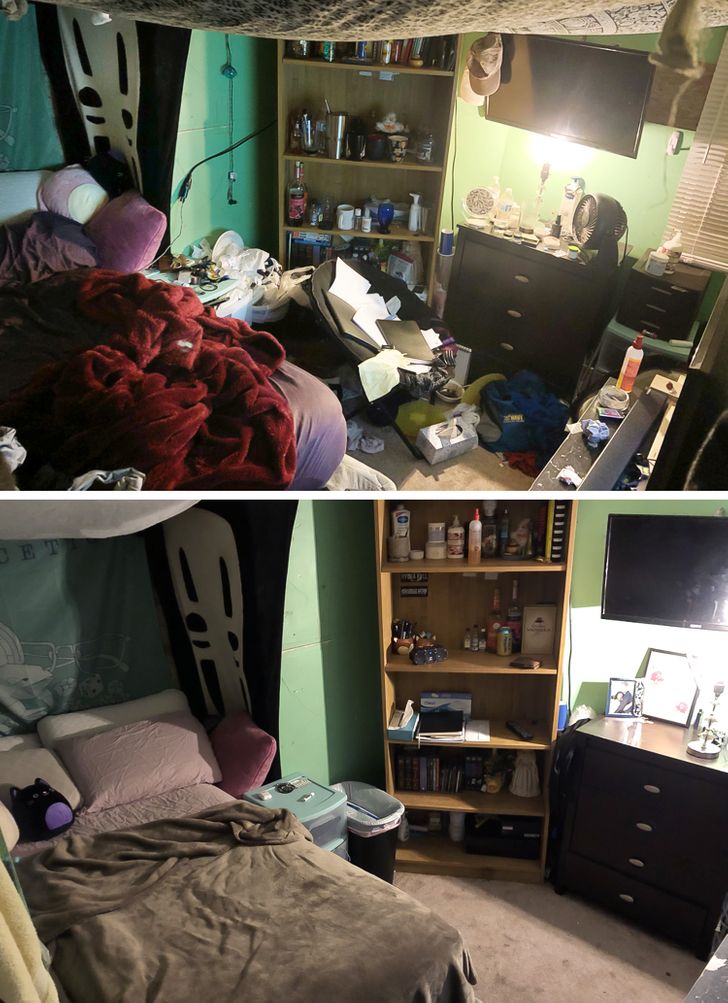 In life, if the eye is already accustomed to these things, it is difficult to notice them, but we look at the photograph with an unwashed look. Start cleaning with exactly those things that annoy you.
In life, if the eye is already accustomed to these things, it is difficult to notice them, but we look at the photograph with an unwashed look. Start cleaning with exactly those things that annoy you.
Use the 20/10 rule
The first thing you want to do when you notice your apartment is dirty is to have a cleaning marathon. You expect that now in a couple of days in the electric broom mode you will close all the problem areas and get a clean house, but, most likely, as a result, you will just get very tired and next time you will decide on a general cleaning not at all soon. Because cleaning will begin to be associated with all the stress that has piled up in the process.
So try to replace the marathon format with short sprints. This practice is pretty similar to the working pomodoro technique that procrastination coaches advise you to use: set a timer for 20 minutes and get out during that time. When the timer rings, take a break for 10 minutes - pour tea, walk the dog. And then go on!
And then go on!
It may seem that in 20 minutes allotted for cleaning you can do very little, but you will be surprised how productive this period of time will be! And the break will give you not only a respite, but also the opportunity to soberly assess how many more sprints you will have today so as not to get exhausted. If desired, gradually increase the time - for example, up to 45 minutes.
Don't care about the big picture
Is the whole house in disarray? So what! With lazy cleaning, the most important thing is to remember what you can actually do right now, without wasting your time trying to do everything at once. Try shifting the focus from “my whole apartment is bedlam” to “this is the dish I can handle.” This will be your way of reminding yourself on a daily basis that you can keep order in small actions that are easy to manage in 10-15 minutes.
We often do not praise ourselves for small victories, but cleanliness in the house is built on them.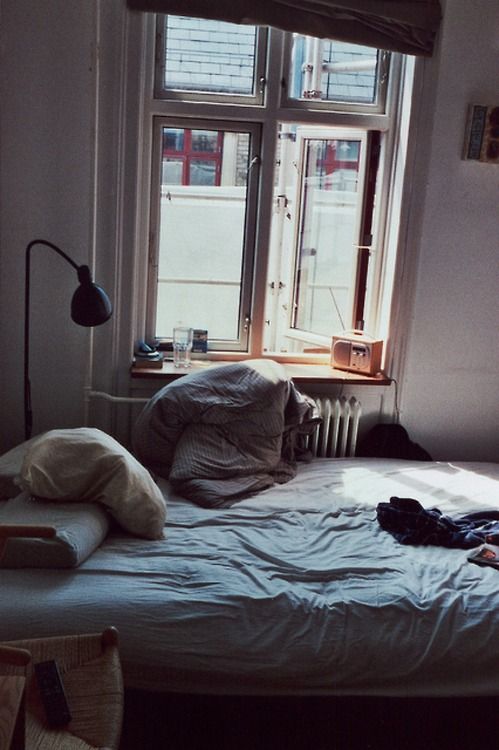 Start by cleaning your bed regularly. It takes little time, but immediately makes the apartment neater. And even such a small action can be a good impetus for the formation of other good habits - for example, washing dishes after dinner right away, and not the next day, when there will be even more of it.
Start by cleaning your bed regularly. It takes little time, but immediately makes the apartment neater. And even such a small action can be a good impetus for the formation of other good habits - for example, washing dishes after dinner right away, and not the next day, when there will be even more of it.
Store cleaning products where you use them
Imagine you are sitting at your desk and you see a stain from yesterday's coffee on it. No matter how you try to scrape it off with your finger, nothing comes out. You need to get up and trudge to the bathroom, where, most likely, all cleaning products are stored. And this point “get up and walk” often becomes an insurmountable obstacle on the way to a table without a spot. But what if you keep your cleaning supplies close by, where you might need them? Try to find a small bottle of cleaner to keep neat on a shelf near your workspace or on the desk itself. Then you are more likely to wipe everything at once, and not postpone until that very day with a cleaning marathon.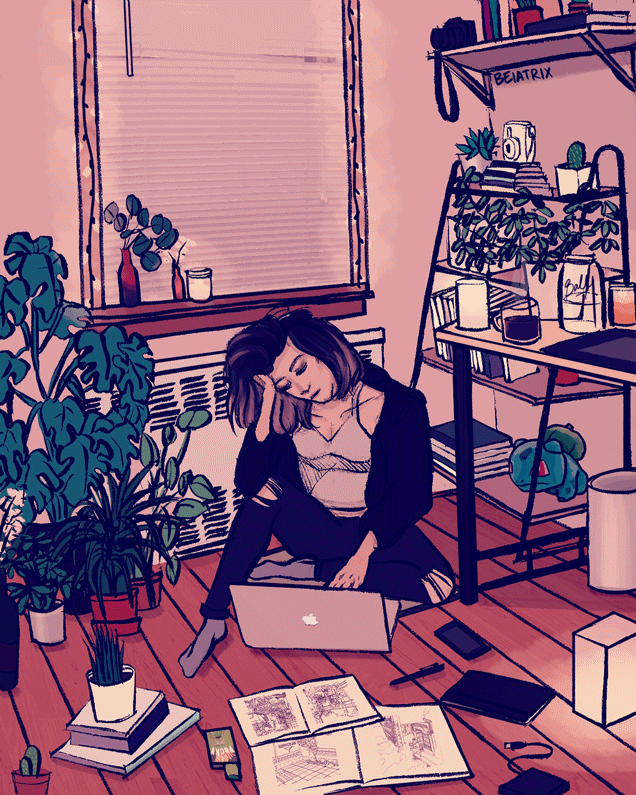
Try the same system for all parts of your apartment that get dirty the fastest. Just keep everything that you might need to clean this place at hand - so you will have more motivation to clean / clean something at any convenient moment, and not put it off until obscure times.
Run the cleaner on the sink, mirror and toilet
When cleaning marathons, we often focus on the rooms where we spend the most time. But what about the bathroom? Of course, a complete cleaning of it will take a lot of time, but for a lazy option, it is enough to wipe the mirrors, sink and toilet. Believe me, after this your bathroom will be transformed.
Introduce the principle of "cleaning on the go"
Cleaning on the go helps to simplify the life of your future self and keep things organized for a long time. And here it is useful to keep in mind a rule in the spirit: “If this can be done in 10 minutes or even faster, then let me do it now rather than walk around and think about whether it is worth taking on for the next three hours. ” Wash dishes after meals, keep things in their fixed places, brush your pet regularly to reduce the amount of hair in the house. Here are a few other options:
” Wash dishes after meals, keep things in their fixed places, brush your pet regularly to reduce the amount of hair in the house. Here are a few other options:
- wipe tables;
- wipe the sink after brushing your teeth;
- if you see a lot of scattered things, remove a couple;
- If you are cooking and waiting for something to cook, use the time to clean up the kitchen area.
Make cleaning fun
Cleaning is often associated with anxiety, stress and fatigue. Try to gradually introduce elements that you like into its process. For example, turn on an audiobook or true-crime podcast while you're cleaning your shelves. Get out to your favorite music or even make a separate playlist for cleaning, because it is much more pleasant to scrub the floors while singing and dancing along.
Don't be afraid to ask friends for help
If you can't cope at all on your own, call for help.